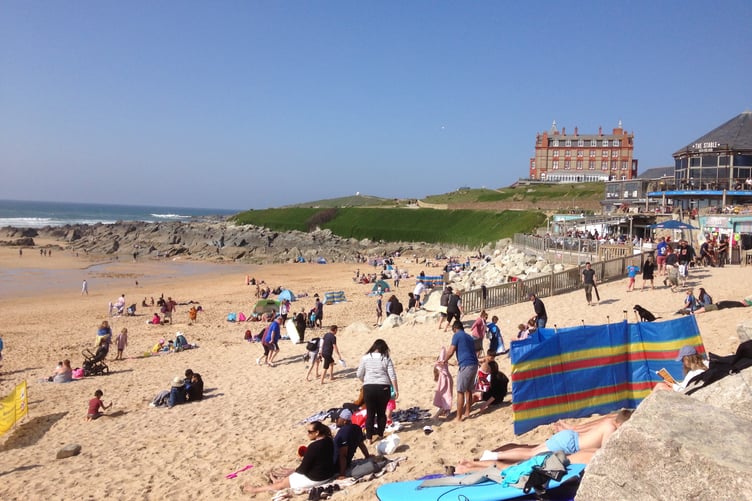Visit Cornwall, the Community Interest Company responsible for promoting Cornwall as a visitor destination since 2015, has made the decision to enter into voluntary liquidation.
Visit Cornwall has played a central role in marketing and representing the county and its 500 Cornish business members. Cornwall has the biggest visitor economy in the UK by population size and the third biggest overall after London and Manchester; the tourism industry brings £2.1-billion per year into the duchy, and accounts for 20 per cent of all jobs, plus many more in service industries.
In their announcement, the directors of Visit Cornwall said they had “been working tirelessly, in an extremely challenging environment, to forge a long-term sustainable future for the body”.
A business review and organisational changes were instigated by the board in August, following which it became clear the organisation’s financial position was “far less robust than was previously understood, and that Visit Cornwall faces insurmountable financial problems in the short term”.
Visit Cornwall chairman Jon Hyatt pointed to the forthcoming end of the UK Shared Prosperity Fund (SPF), a government fund worth £2.6-billion to support investment in communities and local businesses and drive growth.
“The Visit Cornwall Board consists of non-executive voluntary directors responsible for the organisation’s strategic direction,” he said. “The board has explored every avenue possible, including discussions with funders and key partners, to find a solution to these problems.
“However, with Shared Prosperity Fund (SPF) funding, which has been vital to Visit Cornwall for the last four years, ending in March 2026 with no sign of a replacement programme, and another round of payments due to come from our members in the next two months, we had to act.
“Sadly, today’s was the only responsible decision – this was about doing the right thing by our members and doing the right thing for our staff.”
Visit Cornwall’s six paid employees will be supported throughout the voluntary liquidation process, which ensures they will receive redundancy payments.
“This has been an incredibly difficult decision and our priority in the last few weeks has been acting in the best interests of our staff and our members,” Mr Hyatt continued. “We want to thank those staff, our members and partners for their commitment and contribution to Cornwall’s visitor economy over the last decade.
“Visit Cornwall will be missed. It has proved that there is a need for a voice that represents, supports and promotes the sector and it leaves behind it an opportunity for a new voice to emerge. We hope the sector will unite and, with Cornwall Council, make that a reality.”
Reacting to the news Kevin Georgel, chief executive of St Austell Brewery, said: "The news of Visit Cornwall’s liquidation is deeply concerning and marks a critical moment for Cornwall’s visitor economy. As one of the region’s largest employers and a proud champion of Cornish hospitality, we urgently need to understand what a robust and coordinated plan to support the tourism sector looks like moving forward.
"Tourism remains the backbone of Cornwall's economy, supporting thousands of jobs and sustaining so many local businesses. The loss of Visit Cornwall comes at a time when the sector is already facing unprecedented challenges: falling visitor numbers, rising costs and the closure of iconic attractions and venues.
"The sector needs leadership, investment and a clear strategy to navigate the current climate and build resilience for the future, which we recognise can only be delivered by a collaborative approach that brings together public and private businesses to drive recovery and growth."
Visit Cornwall once took its core funding from Cornwall Council. In 2010, the council’s budget for tourism was £2.2-million, but this was reduced to £850,000 before being completely withdrawn in 2015. Visit Cornwall established itself as a not-for-profit Community Interest Company (CiC) at this point.
Over the past 10 years, it has achieved more than 30-million website visits, 180,000 subscribers to its e-news weekly update and a social media following of 430,000, taking Cornwall to a global audience.
It supported the wider visitor economy sector through the pandemic and was a key partner in delivering the G7 summit in Cornwall in 2021. In addition, Cornwall has been voted Best Holiday Region in the UK in 10 out of the past 12 years in the British Travel Awards.
Keith Southwell, managing director of Lappa Valley Steam Railway and chairman of the Cornwall Association of Tourist Attractions (CATA), said: “We are deeply saddened to learn that Visit Cornwall, a valued member organisation within our sector, has entered into a voluntary liquidation.
“Visit Cornwall has played a crucial role in supporting Cornish tourism since 2015, when it moved from a public sector organisation to a CIC. As a fellow membership organisation with complementary objectives, they played a pivotal role in helping to encourage visitors to discover and enjoy our county.
“We work closely with the team, and their work and dedication have been greatly appreciated by visitors, partners, and the wider community for the last 10 years. At this time, our thoughts are with the team, and all those connected with Visit Cornwall - we recognise this is a very difficult period for them.”
The news follows the collapse of similar bodies in Kent and Hertfordshire, after parent company Go To Places folded in September citing a "challenging economic climate" and "rising costs for the sector". Kent County Council (KCC) told BBC Radio Kent it would set up and fund a new group to replace the tourism organisation.
Stuart Roden, former councillor and chairman of the Cornwall Association of Local Councils said: “Surely Cornwall Council should step in to support the tourism industry. It is one of the biggest employers in Cornwall, and thousands rely on the sector for their employment.”
Francis Clark has been appointed to assist with the liquidation process; details of the appointed liquidator will be made available in due course.





Comments
This article has no comments yet. Be the first to leave a comment.